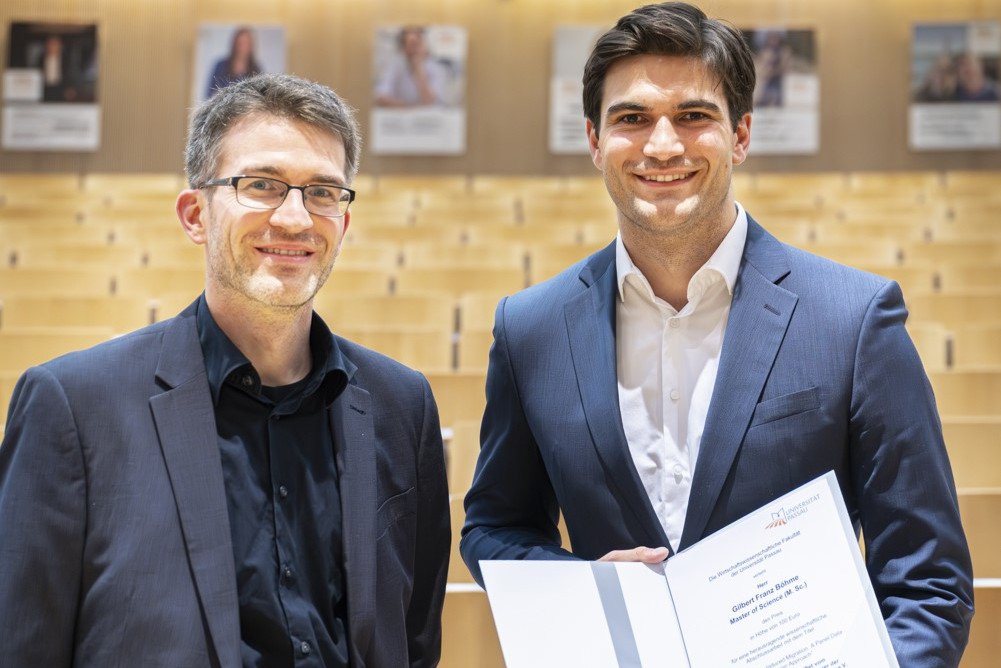
Unsere Lehre umfasst Methoden der Statistik im Bachelor-, Master- und Graduiertenbereich. Im Fokus steht die enge Verzahnung statistisch-methodischer Kenntnisse mit Fähigkeiten zu deren computergestützten Anwendung und Interpretation.

Unser Forschungsschwerpunkt ist die Entwicklung und Anwendung flexibler Regressionsverfahren. Wir betreiben Grundlagenforschung und angewandte Statistik und bearbeiten interdisziplinäre Praxisprojekte mit Partnern aus Wissenschaft, Wirtschaft und Gesellschaft.
Neu im Bachelor bieten wir zusätzlich das Seminar "Angewandte Ökonometrie: Prognose ökonomischer Variablen" an,
Der Lehrstuhl für Statistik und Data Analytics vergibt im Bereich "Statistical market research/decision support" unter Verwendung von Daten aus dem EFRE-geförderten Projekt DIGIONAL Abschlussarbeiten (Bachelor-/Master) zum Thema Revenue Forecasting. Für Details zu Inhalt und Ablauf wenden Sie sich bitte an Prof. Haupt.
Aktuelle Themen für Master-, Bachelor- und Zulassungsarbeiten:
Arbeiten können einen angewandten, softwaregestützten oder theoretischen Fokus haben. Auch die Vergabe zusammenhängender Themen ist möglich. Arbeiten können nach eigener Wahl in Deutsch oder Englisch angefertigt werden. Für weitere Informationen und Fragen bitte an Prof. Haupt wenden.

Wir freuen uns mit Gilbert Böhme über die Auszeichnung mit dem Preis für seine herausragende Abschlussarbeit des Vereins der Freunde und Förderer der Wirtschaftswissenschaften in Passau e.V..
Seine Arbeit trägt den Titel:
Global climate-induced migration: A panel data regression approach
Herzlichen Glückwunsch von uns allen!
Fritsch M., Haupt H., and J. Schnurbus [2025]
Efficiency of poll-based multi-period forecasting systems for German state elections.
International Journal of Forecasting, 41 (2), 670-688
Bauer I., Haupt H., and S. Linner [2024+] Pinball boosting of regression quantiles. Computational Statistics and Data Analysis
Fritsch M., Pua A. A. Y. and J. Schnurbus [2024]
Teaching Advanced Topics in Econometrics using Introductory Textbooks: The Case of Dynamic Panel Data Methods.
International Review of Economics Education, 47, 100297
Ranpal S., von Bargen S., Gilles S., Luschkova D., Landgraf M., Bogawski P., Traidl-Hoffmann C., Büttner C., Damialis A., Fritsch M., and S. Jochner-Oette [2024]
Continental-scale Evaluation of Downy Birch Pollen Production: Estimating the Impacts of Global Change.
Environmental Research, 252, 119114
Jetschni J., Fritsch M., and S. Jochner-Oette [2023]
How does pollen production of allergenic species differ between urban and rural environments?
International Journal of Biometeorology, 67, 1839-1852
Wild M., Behm S., Beck C., Cyris J., Schneider A., Wolf K., and H. Haupt [2022]
Mapping the time-varying spatial heterogeneity of temperature processes over the urban landscape.
Urban Climate, 101160.
Haupt H. and M. Fritsch [2022]
Quantile Trend Regression and Its Application to Central England Temperature.
Mathematics, 10 (3), 413
Fritsch M. and S. Behm [2021]
Data for modeling nitrogen dioxide concentration levels across Germany.
Data in Brief, 38, 107324
Kleinke K., Fritsch M., Stemmler M., Reinecke J., and F. Lösel [2021]
Quantile Regression-Based Multiple Imputation of Missing Values - An Evaluation and Application to Corporal Punishment Data.
Methodology, 17 (3), 205-230
Fritsch M. and S. Behm [2021]
Agglomeration and infrastructure effects in land use regression models for air pollution - Specification, estimation, and interpretations.
Atmospheric Environment, 253, 118337
Fritsch M., Pua A. A. Y. and J. Schnurbus [2021]
pdynmc: A Package for Estimating Linear Dynamic Panel Data Models Based on Nonlinear Moment Conditions.
The R Journal, 13 (1), 218-231
Behm S. and H. Haupt [2020]
Predictability of hourly nitrogen dioxide concentrations,
Ecological Modelling, 428, 109076
Fritsch M., Pua A. A. Y. and J. Schnurbus [2020]
pdynmc: Moment Condition Based Estimation of Linear Dynamic Panel Data Models.
CRAN: https://cran.r-project.org/web/packages/pdynmc/ ; alternatively, see: https://github.com/markusfritsch/pdynmc
Fritsch M., Haupt H., Lösel F. and M. Stemmler [2019]
Regression trees and random forests as alternatives to classical Regression modeling: Investigating the risk factors for corporal punishment.
Psychological Test and Assessment Modelling 61 (4), 389-417
Behm S., Haupt H. and A. Schmid [2018]
Spatial detrending revisited: Modelling local trend patterns in NO2-concentration in Belgium and Germany.
Spatial Statistics 28, 331-351
Haupt H., Schnurbus J. and W. Semmler [2018]
Estimation of grouped, time-varying convergence in economic growth.
Econometrics and Statistics 8, 141-158
Scholz M., Schnurbus J., Haupt H., Dorner V., Landherr A. and F. Probst [2018]
Dynamic Effects of User- and Marketer-Generated Content on Consumer Purchase Behavior: Modeling the Hierarchical Structure of Social Media Websites.
Decision Support Systems 113, 43-55